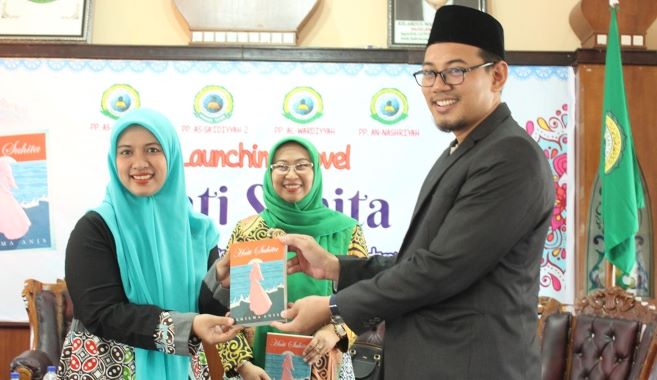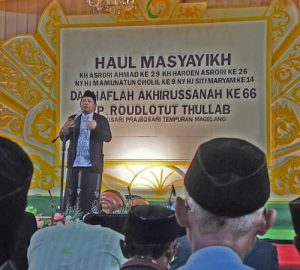Talking about pesantren literature is indeed still an interesting discourse. Many of the language experts, writers, and intellectuals are involved in determining where the pesantren’s literary discourse will be taken. Pros and cons are coloring every discussion that takes place. Starting from defining, scope, to the world of pesantren as a literary object.
In 1973, Gus Dur in his essay entitled “Pesantren dalam Kesusastraan Indonesia (Islamic Boarding School in Indonesian Literature) tried to criticize the lack of writers who made the pesantren as a field of exploration of literature. Gus Dur considered that the reason behind the problem above was abstract things that had become the breath of Islamic boarding schools which were difficult to determine.
The second reason is the sacralization of religion. This point is important to observe, because there is an understanding that all religious interpretations must not be criticized, hit, or reconstructed. Because religion is perfect. This can castrate the interest and seriousness of the writers to dig deeper into the treasures of Islamic boarding schools.
Abdurrahman offered a solution by finding a dramatic problem that did not lead to satire on diversity. What needs to be underlined is that literary works that grow from the pesantren’s womb can answer universal religious dilemmas by bringing together submission to religious values and the needs of modern life.
Hati Suhita (Suhita’s Hearth)
Nearly a year ago, one of my friends told me with enthusiasm about serial stories that were viral in social media, especially Facebook. He then showed me the serial link of Hati Suhita along with the profile page of the author, Khilma Anis. Various posts accompanied by appreciative comments to book this pesantren-style love story into a whole novel.
A few days ago, my friend, Mbak Hilda, managed to get it. Thanks to her friend who was the launching committee of Hati Suhita at Tambak Beras Islamic Boarding School, Jombang. At the same time he get the signature directly from the author who once studied in this pesantren. This is a glimpse of my experience getting acquainted with Suhita.
This novel tells the story of matchmaking that is common among boarding schools, especially on the island of Java. With Alina Suhita and Gus Muhammad Al-Birruni as the main characters. Like an arranged marriage anywhere, there must be rejection and rebellion on one side. And the role was run nicely by Gus Birru who regarded his wife as a strange person who filled his room.
Gus Birru’s refusal broke Ning Alin’s heart, let alone dreaming of being a happy family and having cute children, for seven more months she was not even touched by her husband. Her husband’s cold attitude shackles all the pleasures and beauty she wants to achieve. Coupled with the presence of Rengganis, a woman who can always make her heart break even more because she took her mustika Ampal,
It does not stop there, the presence of Mas Dharma as a lake that calms every problem that afflicts Ning Alin makes the conflict more dramatic. The author is very good at bringing readers to navigate every inch of the lives of the characters calmly and thrillingly.
Past Stories of the Figures
Another advantage of the writer is the strength of each character’s character and past life conflicts. Alina is the daughter of kyai Jabbar who has been prepared to become the daughter in law of Kyai Hannan, the caregiver of pesantren Al-Anwar. Since she was a child living in a thick Islamic boarding school and Javanese tradition that she gained from Mbah Kung puppet story, she made an impression on her. One of the Javanese philosophical teachings “mikul nduwhur mendem jero” (Shouldered high, buried deep) made her stay afloat for everything her husband do to her.
This is in stark contrast to the life of Mas Birru, although he is the son of Kyai Hannan, the sole heir to the Al-Anwar pesantren, who instead goes through life as a movement activist. All matters concerning the pesantren, he hands it over to his wife. The way of his life has always been opposed by his father, including him owning a cafe. His frozen and indifferent attitude was none other than because he could not yet love Alina. It is because of the shadows of Rengganis, his lover and his future which he failed to have due to his parents’ ambitions and the presence of Alina.
Criticism of Islamic Boarding School Traditions and Javanese Philosophy
Indirectly, this novel tries to dismantle the tradition that has been enveloped pesantren and expose it to public. The issues presented, such as arranged marriages, are very rarely brought to the public space, so that the effort to narrate this story nicely deserves appreciation. In addition, the writer bravely uses the term “kingdom” to replace the word pesantren. And subtly contains the message that one of the purposes of matchmaking is to strengthen relations between kingdoms and to exist in the face of the onslaught of times and modernity.
One of the special advantages of this novel is the author’s efforts to combine the culture of the pesantren which is thick with Islamic values with a very philosophical Javanese culture. This combination reminds me of the da’wah efforts carried out by the Walisongo to win the hearts of the Javanese people, namely by merging the teachings of monotheism with the treasures of Javanese culture.
With a relaxed plot, the author breaks down the teachings of our ancestors neatly in classic text, kakawin, songs, and also from stories of puppet plays extracted from the Mahabarata book. Just like when Aruna explained to Alina about the philosophy of Asmaragama which she quoted from Nitimani text.
Before reaching Asmaragama, you have to go through five stages, namely Asmara Nala (Foundation of love), Asmara Tura (Admiration to see), Asmara Tutida (Pride of hearing), Asmara Dana (Fun in talking), Asmara Tantra (pleasure in tasting). Only then will we achieve perfection in Asmaragama (romance).
Besides strong tradition of the pesantren starting from semaan, ziaroh to grave of waliullah, tabarrukan, and so on, all are felt very touching. It is seen when Ning Alin had despaired and intended to end all her love by running away to the pesantren Sunan Tembayat or famously known as Sunan Pandanaran in order to calm herself down.
The Future of Islamic Boarding School Literature
In terms of flow, the reader is spoiled with a slow and relaxed groove. There are also many repetitions of sentences even paragraphs that we often encounter. Maybe it aims to emphasize and reinforce character. There are also a number of errors in words that are a bit annoying to readers, using the word ta with quotation marks. Small, but very annoying.
Alin’s love story and Mas Birru managed to be united happily through their parents’ second prayer and also thanks to the story Mbah Kung told about the loyalty of Dewi Sawitri to her husband, until her husband was revived.
That story made Ning Alin realize that what she did was wrong, and all the grief she faced was a test of her loyalty. Plus, the diction is fairly daring for the level of Islamic novels set in Islamic boarding schools, when talking about erotic things. Of course, by not hitting the values held by the author herself.
Of the many descriptions above, at least this novel has answered Gus Dur’s anxiety about the lack of writers who are struggling in the field of literature writing with Islamic boarding schools and everything that covers them.
In this novel also mentioned a community that was made by Gus Birru to train santri, both urban and remote santri, to be literate in professional journalism. And publish a magazine from the results of the training and distribute it to the public. Maybe this is one concrete step to advance Islamic Boarding School Literature.
In addition, today there are many young writers born from the pesantren’s womb to continue the Indonesian literature relay which was previously mastered by senior writers, such as Gus Mus, Acep Zamzam Noer, Hamdy Salad, Danarto, Ahmad Tohari, Emha Ainun Najib. We can call Usman Arrumy’s name with his book “Kasmaran”. Or children who gather in the Komunitas Kutub Jogja (Jogja Polar Community) that have produced various literary works even have their own printing press.
Also many young translators from among the santri translated various poems and short stories from Arabic content writers, such as Abbas Mammoud Al-Aqqad, Mahmoud Darwis, Mustafa Al-Manfaluthi, Ahmed Syauqi, Kahlil Gibran, Nizar Qabbany, Naguib Mahfoud and writers from other countries. Websites like sastraarab.com also encourage students to take part in Indonesian literature contestation.
For Prose, the name Fauz Noor may also be a reference for how a person who lives in an Islamic boarding school can freely explore the treasures of thought and philosophy of Islam without the slightest bit concerned with Western thought. From the “Tapak Sabda” published in 2004 and followed by “Semesta Sabda” which was published afterwards, we can trace the historical map of thought from the golden generation of Muslim scholars to the contemplation of being more relaxed. Not as rigid as reading a dictate book or a boring yellow book.
I also agreed with Acep Zamzam Noor who said, “The measurment of literature as a work is creativity, without having to pay attention to who and from which circles the author is. Likewise the theme that he raised.” With this, it is clear that people must be more creative in processing imagination, whatever it is. Cooperating deeper into the meaning of life while sharpening language and taste as cultured and civilized efforts.
Where is the future direction of pesantren literature? The answer is in the hands and imagination of today’s sarong generation (santri).
Tabik!
This article is available in Indonesian





